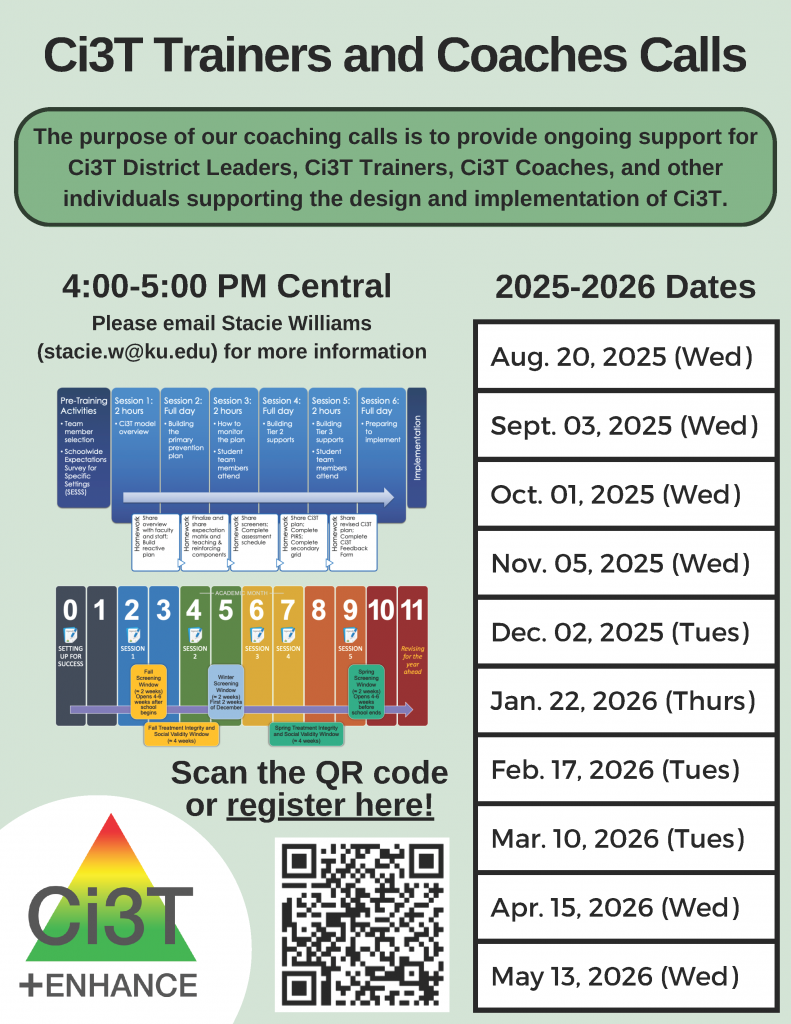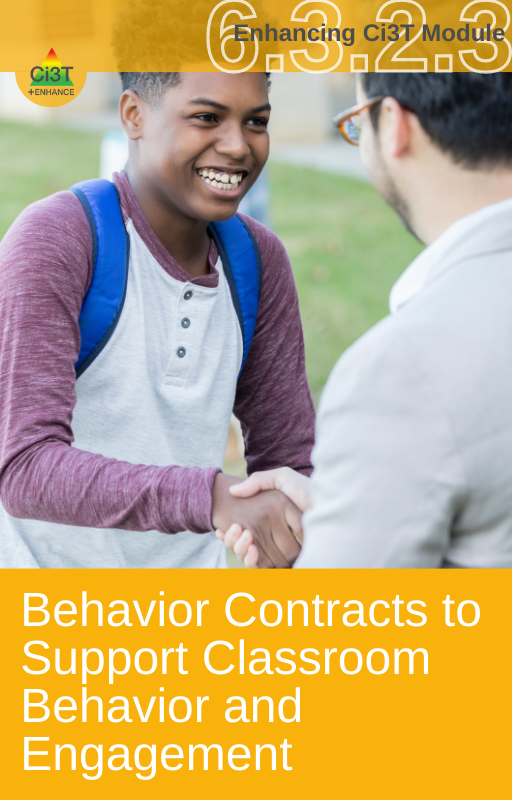
Learn more about professional learning opportunities below, plus Tier 2 and Tier 3 strategies and interventions that can be explored by watching an introductory video to the strategy or intervention (where available) and downloading supporting documents.

2025-2026 Ci3T Project EMPOWER
These 2-hour stand-alone sessions on Zoom are free — come to one, come to all! See flyer for details, dates and times, and registration link, or register here.
2025-2026 EMPOWER

2025-2026 Ci3T Trainers and Coaches Calls
The purpose of our coaching calls is to provide ongoing support for Ci3T District Leaders, Ci3T Trainers, Ci3T Coaches, and other individuals supporting the design and implementation of Ci3T. We offer these calls as a service activity to support those committed to meeting students’ multiple needs in academic, behavior, and social domains. Open to all interested parties — to join these calls, please register here!
TIERED INTERVENTION LIBRARY
Learn more about Tier 2 and Tier 3 strategies and interventions below by watching an introductory video and downloading supporting documents. In these materials you will learn more about each strategy, why it is effective, the research supporting its use, and how to evaluate treatment integrity and social validity. Also included are PDFs and/ or Microsoft Word documents of what the intervention would look like as described in a school’s tiered intervention grid, research article references, practitioner article references, and more.
Professional Learning
 Good news! These materials have been enhanced and can now be found on the Enhancing Ci3T Modules tab.
Good news! These materials have been enhanced and can now be found on the Enhancing Ci3T Modules tab.  Good news! These materials have been enhanced and can now be found on the Enhancing Ci3T Modules tab.
Good news! These materials have been enhanced and can now be found on the Enhancing Ci3T Modules tab.  Good news! These materials have been enhanced and can now be found on the Enhancing Ci3T Modules tab.
Good news! These materials have been enhanced and can now be found on the Enhancing Ci3T Modules tab.  Good news! These materials have been enhanced and can now be found on the Enhancing Ci3T Modules tab.
Good news! These materials have been enhanced and can now be found on the Enhancing Ci3T Modules tab.  Good news! These materials have been enhanced and can now be found on the Enhancing Ci3T Modules tab.
Good news! These materials have been enhanced and can now be found on the Enhancing Ci3T Modules tab.  Good news! These materials have been enhanced and can now be found on the Enhancing Ci3T Modules tab.
Good news! These materials have been enhanced and can now be found on the Enhancing Ci3T Modules tab.  Good news! These materials have been enhanced and can now be found on the Enhancing Ci3T Modules tab.
Good news! These materials have been enhanced and can now be found on the Enhancing Ci3T Modules tab.  Good news! These materials have been enhanced and can now be found on the Enhancing Ci3T Modules tab.
Good news! These materials have been enhanced and can now be found on the Enhancing Ci3T Modules tab.  Good news! These materials have been enhanced and can now be found on the Enhancing Ci3T Modules tab.
Good news! These materials have been enhanced and can now be found on the Enhancing Ci3T Modules tab.  Good news! These materials have been enhanced and can now be found on the Enhancing Ci3T Modules tab.
Good news! These materials have been enhanced and can now be found on the Enhancing Ci3T Modules tab. REPEATED READINGS (POSTED DECEMBER 28, 2015)
- Introduction
- PowerPoint presentation
- Sample peer checklist
- Sample student data collection graph
- Sample teacher data collection form and graph
- Intervention grid: PDF or MS-Word
- Implementation checklist
- Treatment integrity checklist
- Social validity: student forms
- Social validity: student forms scoring overview PowerPoint.pptx
- Social validity: student forms scoring guide
- Social validity: student forms scoring tool.xlsx
- Social validity: adult forms
- Resource guide
 Good news! These materials have been enhanced and can now be found on the Enhancing Ci3T Modules tab.
Good news! These materials have been enhanced and can now be found on the Enhancing Ci3T Modules tab.  Good news! These materials have been enhanced and can now be found on the Enhancing Ci3T Modules tab.
Good news! These materials have been enhanced and can now be found on the Enhancing Ci3T Modules tab.  Good news! These materials have been enhanced and can now be found on the Enhancing Ci3T Modules tab.
Good news! These materials have been enhanced and can now be found on the Enhancing Ci3T Modules tab. Project EMPOWER from the Past
2024-2025 EMPOWER
2024-2025 Project EMPOWER+ S7 Agenda (Ci3T Research Team led)
2024-2025 Project EMPOWER+ S7 Agenda
2024-2025 Project EMPOWER+ S7 Presentation
2024-2025 Project EMPOWER+ S7 Pacing Guide
2024-2025 Project EMPOWER+ S7 Video Recording
Handouts
Handout 1: Function Matrix Practice
Handout 2: Measurement Practice
Handout 3: A-R-E Component Practice
2023-2024 EMPOWER
2023-2024 EMPOWER T-Ci3T S1 Agenda
2023-2024 EMPOWER T-Ci3T S1 Presentation
2023-2024 EMPOWER T-Ci3T S1 Pacing Guide
Video recording Session 1
Project ENHANCE Version (featuring modules)
2023-2024 EMPOWER E-Ci3T S1 Agenda
2023-2024 EMPOWER E-Ci3T S1 Presentation
2023-2024 EMPOWER E-Ci3T S1 Pacing Guide
Video recording Session 1
2023-2024 EMPOWER T-Ci3T S2 Agenda
2023-2024 EMPOWER T-Ci3T S2 Presentation
2023-2024 EMPOWER T-Ci3T S2 Pacing Guide
Video recording Session 2
Project ENHANCE Version (featuring modules)
2023-2024 EMPOWER E-Ci3T S2 Agenda
2023-2024 EMPOWER E-Ci3T S2 Presentation
2023-2024 EMPOWER E-Ci3T S2 Pacing Guide
Video recording Session 2
2023-2024 EMPOWER T-Ci3T S3 Agenda
2023-2024 EMPOWER T-Ci3T S3 Presentation
2023-2024 EMPOWER T-Ci3T S3 Pacing Guide
Video recording Session 3
Project ENHANCE Version (featuring modules)
2023-2024 EMPOWER E-Ci3T S3 Agenda
2023-2024 EMPOWER E-Ci3T S3 Presentation
2023-2024 EMPOWER E-Ci3T S3 Pacing Guide
Video recording Session 3
2023-2024 EMPOWER T-Ci3T S4 Agenda
2023-2024 EMPOWER T-Ci3T S4 Presentation
2023-2024 EMPOWER T-Ci3T S4 Pacing Guide
Video recording Session 4
Project ENHANCE Version (featuring modules)
2023-2024 EMPOWER E-Ci3T S4 Agenda
2023-2024 EMPOWER E-Ci3T S4 Presentation
2023-2024 EMPOWER E-Ci3T S4 Pacing Guide
Video recording Session 4
2023-2024 EMPOWER T-Ci3T S5 Agenda
2023-2024 EMPOWER T-Ci3T S5 Presentation
2023-2024 EMPOWER T-Ci3T S5 Pacing Guide
Managing Acting-Out Behavior Resource Guide (video links included!)
Video recording Session 5
Project ENHANCE Version (featuring modules)
2023-2024 EMPOWER E-Ci3T S5 Agenda
2023-2024 EMPOWER E-Ci3T S5 Presentation
2023-2024 EMPOWER E-Ci3T S5 Pacing Guide
Managing Acting-Out Behavior Resource Guide (with video links!)
Video recording Session 5
2023-2024 EMPOWER T-Ci3T S6 Agenda
2023-2024 EMPOWER T-Ci3T S6 Presentation
2023-2024 EMPOWER T-Ci3T S6 Pacing Guide
Video recording Session 6
Project ENHANCE Version (featuring modules)
2023-2024 EMPOWER E-Ci3T S6 Agenda
2023-2024 EMPOWER E-Ci3T S6 Presentation
2023-2024 EMPOWER E-Ci3T S6 Pacing Guide
Video recording Session 6
2022-2023 EMPOWER Zoom
2021-2022 EMPOWER Resources
2021-2022 EMPOWER S2 Presentation
2021-2022 EMPOWER S2 Notes
2021-2022 EMPOWER S2 Pacing Guide
Function-Based Reinforcer Menu
Setting Expectations Lesson Plan Exemplar
Setting Expectations Lesson Plan Template
Ci3T Integrated Lesson Plan Template
Video recording Session 2
2020-2021 EMPOWER Resources
2020-2021 EMPOWER S4 Presentation
2020-2021 EMPOWER S4 Notes
2020-2021 EMPOWER S4 Pacing Guide
Video recording not available
2020-2021 EMPOWER S5 Presentation
2020-2021 EMPOWER S5 Notes
2020-2021 EMPOWER S5 Pacing Guide
Video Recording Session 5:
Overview of Ci3T
Internalizing behaviors
Anxiety strategies
Relaxation training
Relaxation protocol
Self-monitoring
Cognitive restructuring
Functional assessment-based interventions
Anxiety strategies to share with parents
